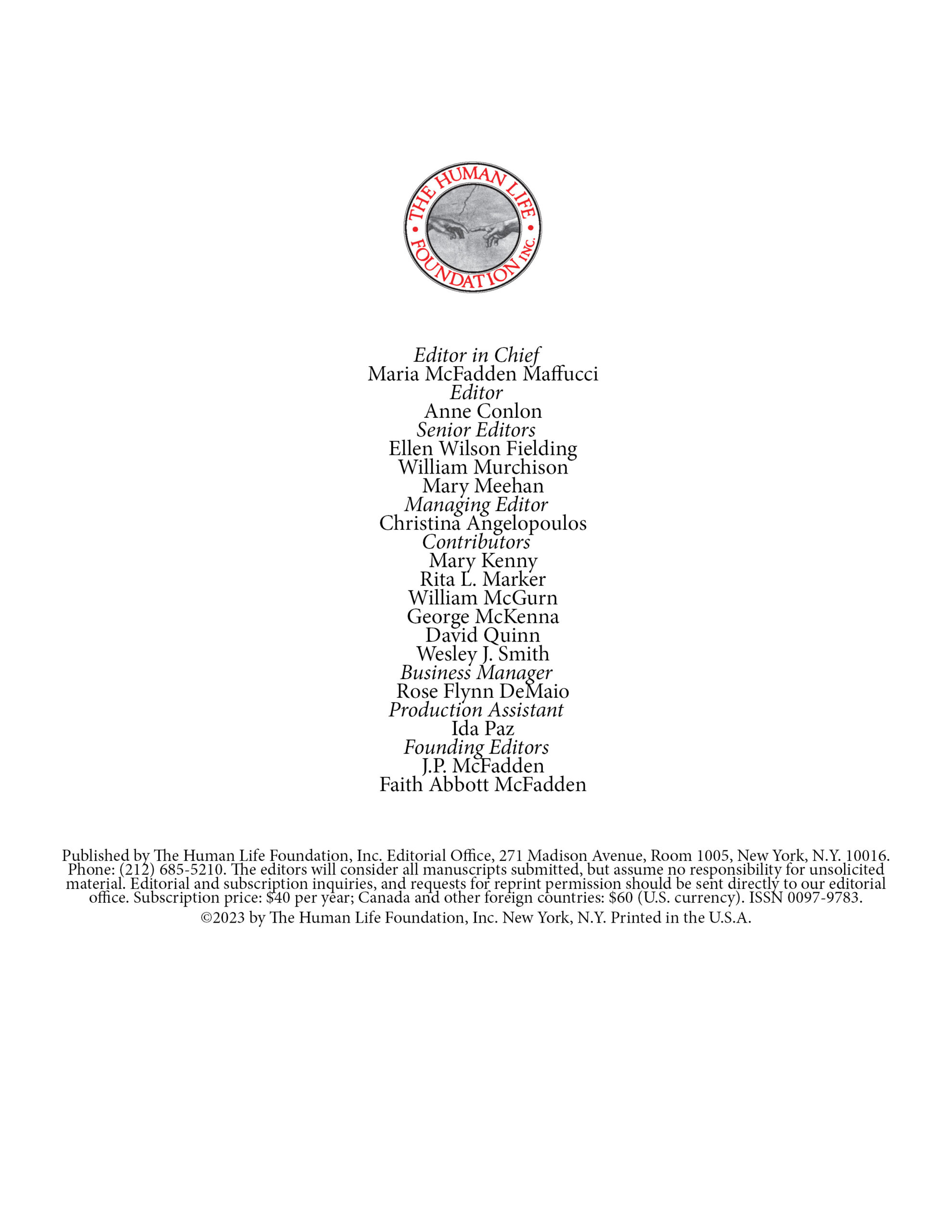| Hover and click over an underlined article to read, or select article below issue!
|
 - About this issue . . .
. . . October 17, 2023, marked 25 years to the day of the death of our founding editor James P. McFadden, at 68 years old. He died suddenly—though not unexpectedly as his cancer was terminal—at 4 am on a Saturday, just about 12 hours after we’d all put the finishing touches on the Fall 1998 Review at the office.
Looking back, there are sobering connections between that issue and this one. In 1998, we featured a symposium: “Infanticide Chic II: Professor Singer Goes to Princeton.” Singer, an advocate for Animal Liberation (in fact, the title of his first book), abortion and infanticide, had just been awarded a prestigious chair at the Ivy League institution. Twenty-five years later, Singer is still ensconced at Princeton, and has a new book out, Ethics in the Real World: 90 Essays on Things that Matter, reviewed by Wesley Smith on p. 71. Smith writes that Singer is both “one of the most villainous thinkers of our age” and (sadly) “one of the most influential.” He has been “particularly successful in smashing the sanctity of life ethic.” J.P. recognized Singer’s evil potential decades ago: In the essay he wrote in 1983, “Toward the New Future” (which we reprint here as Appendix A), he introduced Singer to Review readers, appalled that this young Australian professor’s support for the infanticide of disabled babies had been promoted by our own American Academy of Pediatrics. “Singer does represent the New Future,” J.P. wrote. Infanticide “logically follows” abortion, and “as everybody knows, is already a widespread practice.” Forty years later, it has become horribly routine, as Edward Mechmann describes in “Stealth Eugenic Euthanasia of Disabled Infants,” p. 17, and what a loss to the world! For a beautiful example of a win, in that regard, don’t miss Jason Morgan’s review (p.75) of a Japanese documentary about “the world’s greatest living calligrapher;” the artist Kanazawa Shoko, who has Down syndrome, and who has changed the world with her infectious joy and astounding talent.
In his essay, J.P. gave us his “modest proposal”: that medical professionals be required to “add a few more letters to their shingles: S.L.E. or Q.L.E.—sanctity or quality of life.” We welcome an expert on such matters to the Review on p. 50, our interview with Dr. Christina Francis, CEO of the American Association of Pro-Life Obstetricians and Gynecologists. “Every life has inherent value and worth, and this is not dependent on a person’s ability level.” Amen. Yet Dr. Francis lets us know how S.L.E. doctors are attacked for daring to uphold the truth.
Our thanks go to Richard Stith for his important piece on “The Exportable Dobbs,” and National Review for permission to reprint Leah Libresco Sargeant’s inspiring article on pro-life persuasion. (And thanks as always to Nick Downes for his reviving humor.) On a final note, there was a glimpse of cultural hope in the current BBC drama World on Fire. Two British soldiers disagree about saving the life of their German prisoner, as all three of them struggle to survive in the African desert during World War II. The more senior soldier is from India—and has been subject to persecution from his white peers—yet he insists on aiding the prisoner: “The value of a life, is the value of a life, is the value of a life.” Would that these true words echo and expand in our troubled times.
Maria McFadden Maffucci
Editor in Chief
- You are perhaps used to seeing Ellen Wilson Fielding’s essays bringing up the rear of featured articles; indeed, I am used to placing them there to assure a strong close. But this time our senior editor takes the lead, and what a brilliant one “Descending from Paganism” provides. Here is a writer at the top of her game, grappling with sometimes uncomfortable and little-noticed truths. Like this one: “Some very thoughtful writers and thinkers go partially wrong,” Fielding writes, “in speaking of the re-paganization of our formerly Christian civilization. Although they rightly draw our attention to all the major indices of religious, moral, and familial collapse, not all of them seem to sufficiently appreciate how de-Christianizing differs from re-paganizing.” And therein begins a bracing review of pagan culture (“‘pagan’ does not mean addicted to orgies”) that may have you wishing for an actual pagan revival as the West spurns the Christian ethos and with it “the fecund source of its creativity, vitality, attractiveness, and inspiration.”
Our elites are hell-bent on obliterating Christianity—why? Could they be “seeking to fend off their own participation in evil”? In “Another Disquieting Suggestion,” longtime theology professor Charles Bellinger conjures up a dystopian tale (after Alasdair MacIntyre in After Virtue) about a society where “evil must always be viewed as external to the self,” and “the notion that the line dividing good and evil runs through every human heart is the one piece of deep understanding that must never be allowed.” Of course, this denial of human nature and agency is the antithesis of the Christian proposition, and to Bellinger’s point, produces instead an “‘I’m okay, you’re okay’ mindset,” one primed to tune out the selective dehumanization that politicians and other powerbrokers impose on whole classes of people to justify moral aberrations like abortion—and slavery, and the Holocaust.
Read More
|
